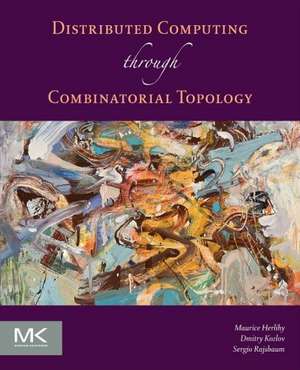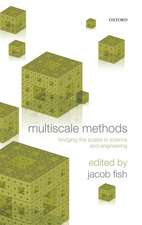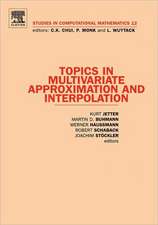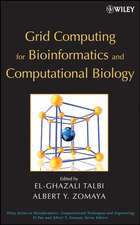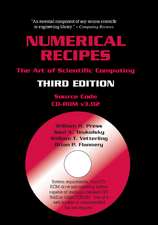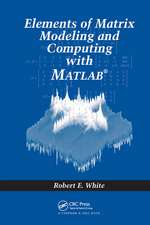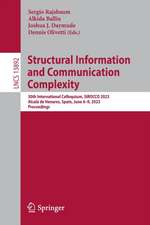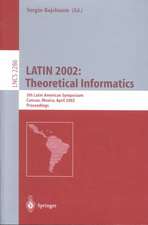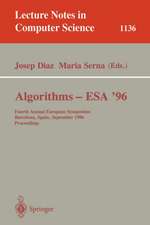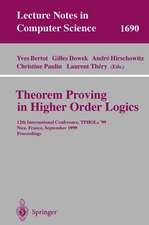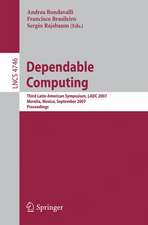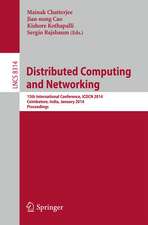Distributed Computing Through Combinatorial Topology
Autor Maurice Herlihy, Dmitry Kozlov, Sergio Rajsbaumen Limba Engleză Paperback – 19 ian 2014
Today, a new student or researcher must assemble a collection of scattered conference publications, which are typically terse and commonly use different notations and terminologies. This book provides a self-contained explanation of the mathematics to readers with computer science backgrounds, as well as explaining computer science concepts to readers with backgrounds in applied mathematics. The first section presents mathematical notions and models, including message passing and shared-memory systems, failures, and timing models. The next section presents core concepts in two chapters each: first, proving a simple result that lends itself to examples and pictures that will build up readers' intuition; then generalizing the concept to prove a more sophisticated result. The overall result weaves together and develops the basic concepts of the field, presenting them in a gradual and intuitively appealing way. The book's final section discusses advanced topics typically found in a graduate-level course for those who wish to explore further.
- Named a 2013 Notable Computer Book for Computing Methodologies by Computing Reviews
- Gathers knowledge otherwise spread across research and conference papers using consistent notations and a standard approach to facilitate understanding
- Presents unique insights applicable to multiple computing fields, including multicore microprocessors, wireless networks, distributed systems, and Internet protocols
- Synthesizes and distills material into a simple, unified presentation with examples, illustrations, and exercises
Preț: 398.82 lei
Preț vechi: 480.64 lei
-17% Nou
Puncte Express: 598
Preț estimativ în valută:
76.32€ • 79.39$ • 63.01£
76.32€ • 79.39$ • 63.01£
Carte tipărită la comandă
Livrare economică 05-19 aprilie
Preluare comenzi: 021 569.72.76
Specificații
ISBN-13: 9780124045781
ISBN-10: 0124045782
Pagini: 336
Ilustrații: illustrations
Dimensiuni: 191 x 235 x 20 mm
Greutate: 0.68 kg
Editura: ELSEVIER SCIENCE
ISBN-10: 0124045782
Pagini: 336
Ilustrații: illustrations
Dimensiuni: 191 x 235 x 20 mm
Greutate: 0.68 kg
Editura: ELSEVIER SCIENCE
Public țintă
Grad / undergrad students in CS or Math; as well as working researchers or computer engineers.Cuprins
I. Fundamentals1. Introduction2. Two-Process Systems3. Elements of Combinatorial Topology
II. Colorless Tasks4. Colorless Wait-free Computation5. Solvability of Colorless Tasks6. Byzantine Colorless Computation7. Simulations and Reductions
III. General Tasks8. Read-Write Protocols for General Tasks9. Manifold Protocols10. Connectivity11. Wait-Free Computability for General Tasks
IV. Advanced Topics12. Renaiming and Oriented Manifolds13. Task Solvability in Different Communication Models14. Colored Simulations and Reductions15. Classifying Loop Agreement Tasks16. Immediate Snapshot Subdivisions
II. Colorless Tasks4. Colorless Wait-free Computation5. Solvability of Colorless Tasks6. Byzantine Colorless Computation7. Simulations and Reductions
III. General Tasks8. Read-Write Protocols for General Tasks9. Manifold Protocols10. Connectivity11. Wait-Free Computability for General Tasks
IV. Advanced Topics12. Renaiming and Oriented Manifolds13. Task Solvability in Different Communication Models14. Colored Simulations and Reductions15. Classifying Loop Agreement Tasks16. Immediate Snapshot Subdivisions
Recenzii
"...very well-written. All the figures, examples, and illustrations serve nicely to explain various concepts...mathematicians and computer scientists both would equally benefit from this book...a new researcher in this area would find this book very helpful" --SIGACT News
"...the first systematic exposition of an approach to distributed computing based on tools of combinatorial topology…a valuable addition to the existing literature, it will be appreciated by many different categories of readers including university students and researchers in computers science as well as topologists interested in practical applications." --Zentralblatt MATH
"This outstanding book...explores the connections between distributed computation and topology in detail...systematically organizes material that previously was only available across a collection of conference and journal publications with inconsistent notations and terminology..." --Computing Reviews
"...there has not been a monograph that comprehensively covers the intersection of topology and distributed computing...This book thus finds its place for filling precisely this niche, and will be welcomed by readers..." --Computing Reviews, July 24 2014
"In Distributed Computing, the modern mathematical field of Combinatorial Topology finally finds a natural application space. This book elucidates this intriguing connection through a series of well thought out examples, making complex computational phenomena and the deep theorems seem intuitive even to the beginner. I highly recommend it to anyone who is interested in the fundamentals of computing, since asynchrony, the key phenomena this book explains, is bound to dominate computation and communication in years to come." --Prof. Nir Shavit, Professor of Computer Science, Massachusetts Institute of Technology, Cambridge, MA
"Written by the leading experts in this area, this book is a unique endeavor covering the exciting topic of understanding distributed computing through topology. The book will appeal to researchers in distributed computing and to mathematicians." --Prof. Hagit Attiya, Professor of Computer Science, Technion – Israel Institute of Technology
"This book is a major contribution to distributed computing, integrated with algebraic topology. Based on the seminal work of the authors, it represents a collection of the most up-to-date results in the field, presented in a very progressive manner, from intuitions to detailed proofs and connections to fundamental mathematical concepts." --Éric Goubault, cea list and École Polytechnique
"...the first systematic exposition of an approach to distributed computing based on tools of combinatorial topology…a valuable addition to the existing literature, it will be appreciated by many different categories of readers including university students and researchers in computers science as well as topologists interested in practical applications." --Zentralblatt MATH
"This outstanding book...explores the connections between distributed computation and topology in detail...systematically organizes material that previously was only available across a collection of conference and journal publications with inconsistent notations and terminology..." --Computing Reviews
"...there has not been a monograph that comprehensively covers the intersection of topology and distributed computing...This book thus finds its place for filling precisely this niche, and will be welcomed by readers..." --Computing Reviews, July 24 2014
"In Distributed Computing, the modern mathematical field of Combinatorial Topology finally finds a natural application space. This book elucidates this intriguing connection through a series of well thought out examples, making complex computational phenomena and the deep theorems seem intuitive even to the beginner. I highly recommend it to anyone who is interested in the fundamentals of computing, since asynchrony, the key phenomena this book explains, is bound to dominate computation and communication in years to come." --Prof. Nir Shavit, Professor of Computer Science, Massachusetts Institute of Technology, Cambridge, MA
"Written by the leading experts in this area, this book is a unique endeavor covering the exciting topic of understanding distributed computing through topology. The book will appeal to researchers in distributed computing and to mathematicians." --Prof. Hagit Attiya, Professor of Computer Science, Technion – Israel Institute of Technology
"This book is a major contribution to distributed computing, integrated with algebraic topology. Based on the seminal work of the authors, it represents a collection of the most up-to-date results in the field, presented in a very progressive manner, from intuitions to detailed proofs and connections to fundamental mathematical concepts." --Éric Goubault, cea list and École Polytechnique
